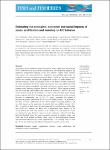Estimating the ecological, economic and social impacts of ocean acidification and warming on UK fisheries
| dc.contributor.author | Fernandes, JA | |
| dc.contributor.author | Papathanasopoulou, E | |
| dc.contributor.author | Hattam, C | |
| dc.contributor.author | Queirós, AM | |
| dc.contributor.author | Cheung, WWWL | |
| dc.contributor.author | Yool, A | |
| dc.contributor.author | Artioli, Y | |
| dc.contributor.author | Pope, EC | |
| dc.contributor.author | Flynn, KJ | |
| dc.contributor.author | Merino, G | |
| dc.contributor.author | Calosi, P | |
| dc.contributor.author | Beaumont, N | |
| dc.contributor.author | Austen, MC | |
| dc.contributor.author | Widdicombe, S | |
| dc.contributor.author | Barange, M | |
| dc.date.accessioned | 2024-04-24T11:23:59Z | |
| dc.date.available | 2024-04-24T11:23:59Z | |
| dc.date.issued | 2017-05 | |
| dc.identifier.issn | 1467-2960 | |
| dc.identifier.issn | 1467-2979 | |
| dc.identifier.uri | https://pearl.plymouth.ac.uk/handle/10026.1/22305 | |
| dc.description.abstract |
<jats:title>Abstract</jats:title><jats:p>Assessments of the combined ecological impacts of ocean acidification and warming (<jats:styled-content style="fixed-case">OAW</jats:styled-content>) and their social and economic consequences can help develop adaptive and responsive management strategies in the most sensitive regions. Here, available observational and experimental data, theoretical, and modelling approaches are combined to project and quantify potential effects of <jats:styled-content style="fixed-case">OAW</jats:styled-content> on the future fisheries catches and resulting revenues and employment in the <jats:styled-content style="fixed-case">UK</jats:styled-content> under different <jats:styled-content style="fixed-case">CO</jats:styled-content><jats:sub>2</jats:sub> emission scenarios. Across all scenarios, based on the limited available experimental results considered, the bivalve species investigated were more affected by <jats:styled-content style="fixed-case">OAW</jats:styled-content> than the fish species considered, compared with ocean warming alone. Projected standing stock biomasses decrease between 10 and 60%. These impacts translate into an overall fish and shellfish catch decrease of between 10 and 30% by 2020 across all areas except for the Scotland >10 m fleet. This latter fleet shows average positive impacts until 2050, declining afterwards. The main driver of the projected decreases is temperature rise (0.5–3.3 °C), which exacerbate the impact of decreases in primary production (10–30%) in <jats:styled-content style="fixed-case">UK</jats:styled-content> fishing waters. The inclusion of the effect of ocean acidification on the carbon uptake of primary producers had very little impact on the projections of potential fish and shellfish catches (<1%). The <10 m fleet is likely to be the most impacted by‐catch decreases in the short term (2020–50), whereas the effects will be experienced more strongly by the >10 m fleet by the end of the century in all countries. Overall, losses in revenue are estimated to range between 1 and 21% in the short term (2020–50) with England and Scotland being the most negatively impacted in absolute terms, and Wales and North Ireland in relative terms. Losses in total employment (fisheries and associated industries) may reach approximately 3–20% during 2020–50 with the >10 m fleet and associated industries bearing the majority of the losses.</jats:p> | |
| dc.format.extent | 389-411 | |
| dc.language | en | |
| dc.publisher | Wiley | |
| dc.subject | Economic impact | |
| dc.subject | employment | |
| dc.subject | fisheries | |
| dc.subject | ocean acidification and warming | |
| dc.subject | revenue | |
| dc.subject | social impact | |
| dc.title | Estimating the ecological, economic and social impacts of ocean acidification and warming on UK fisheries | |
| dc.type | Journal Article | |
| plymouth.issue | 3 | |
| plymouth.volume | 18 | |
| plymouth.publication-status | Published | |
| plymouth.journal | Fish and Fisheries | |
| dc.identifier.doi | 10.1111/faf.12183 | |
| plymouth.organisational-group | |Plymouth | |
| plymouth.organisational-group | |Plymouth|Faculty of Science and Engineering | |
| plymouth.organisational-group | |Plymouth|Faculty of Science and Engineering|School of Biological and Marine Sciences | |
| plymouth.organisational-group | |Plymouth|REF 2021 Researchers by UoA | |
| plymouth.organisational-group | |Plymouth|Users by role | |
| plymouth.organisational-group | |Plymouth|Users by role|Current Academic staff | |
| plymouth.organisational-group | |Plymouth|REF 2021 Researchers by UoA|UoA14 Geography and Environmental Studies | |
| plymouth.organisational-group | |Plymouth|REF 2021 Researchers by UoA|UoA14 Geography and Environmental Studies|UoA14 Geography and Environmental Studies MANUAL | |
| plymouth.organisational-group | |Plymouth|Users by role|Researchers in ResearchFish submission | |
| plymouth.organisational-group | |Plymouth|REF 2029 Researchers by UoA | |
| plymouth.organisational-group | |Plymouth|REF 2029 Researchers by UoA|UoA14 Geography and Environmental Studies | |
| plymouth.organisational-group | |Plymouth|Users by role|Former Academic staff | |
| dcterms.dateAccepted | 2016-08-11 | |
| dc.date.updated | 2024-04-24T11:23:58Z | |
| dc.rights.embargodate | 2024-04-26 | |
| dc.identifier.eissn | 1467-2979 | |
| rioxxterms.versionofrecord | 10.1111/faf.12183 |


